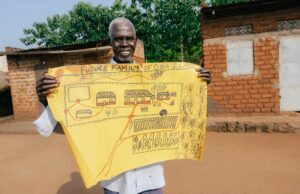PIP stands for Participatory Integrated Plan and is an approach that is simple and powerful: families reflect on where they are now, what is their dream, and which concrete steps can move them towards that dream. Farmer families take ownership of their development and become stewards of more resilient farms.
All family members are invited to participate. They develop a visual future plan, together with an action plan. They map the current situation and outline the desired future situation and the concrete steps needed to achieve this.
Healthy food
Creating a PIP plan together, changes mindsets: from short- to long-term visions, from passive to engaged, from seeing problems to seeing opportunities. Farmers families learn sustainable land conservation techniques and climate-smart farming techniques. Farm families are able to produce healthier food and with the revenues from sales, better ensure the wellbeing of their children, as they were able to afford things like school fees and better housing and clothing.
PIP website
The PIP approach is developed in cooperation with the Wageningen University. For impact stories, videos and more, take a look at this PIP website.

